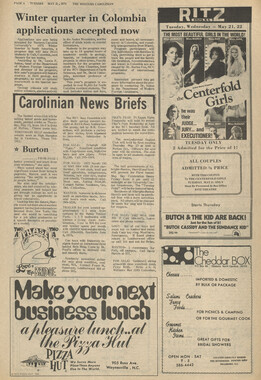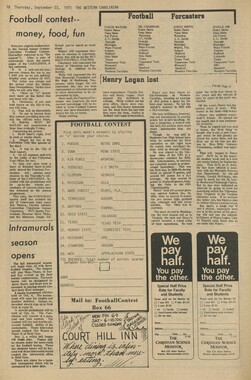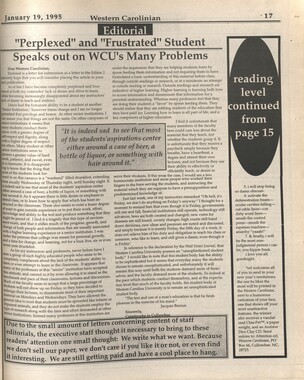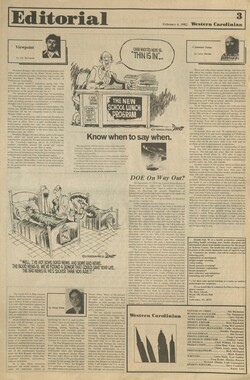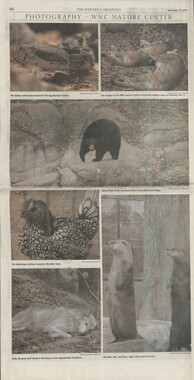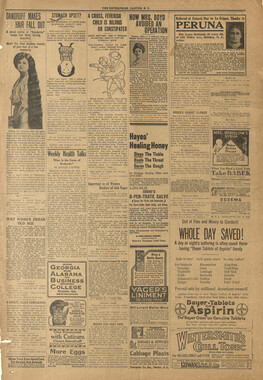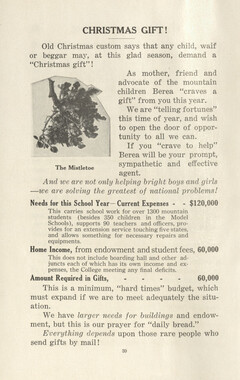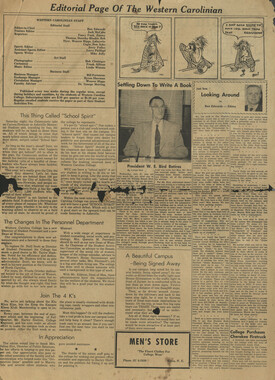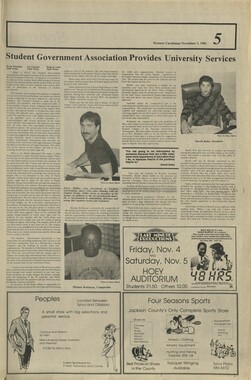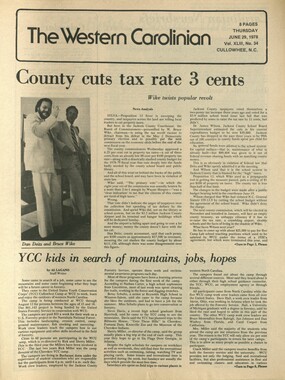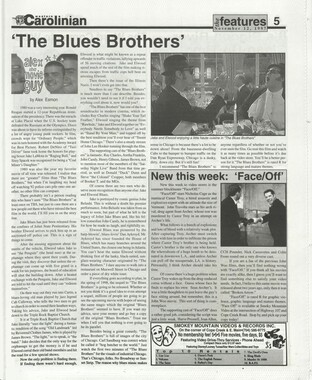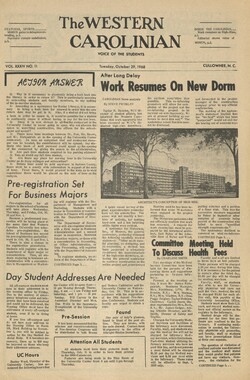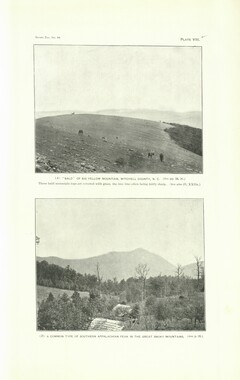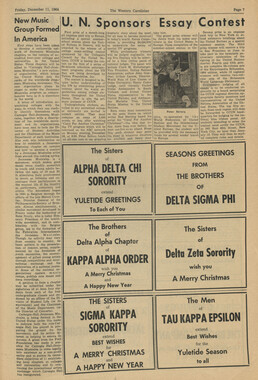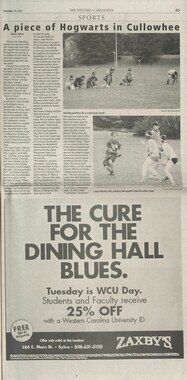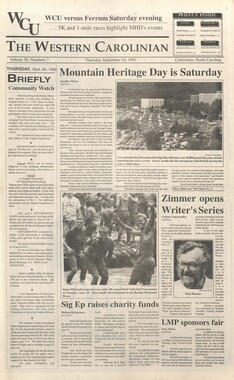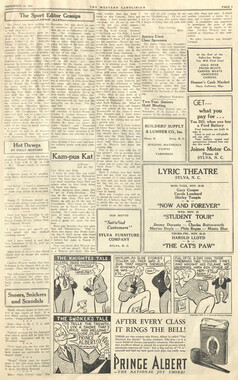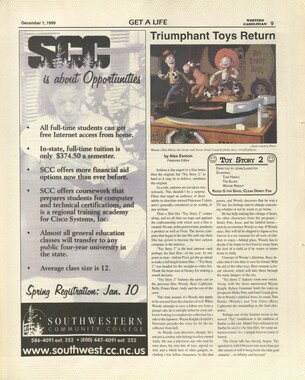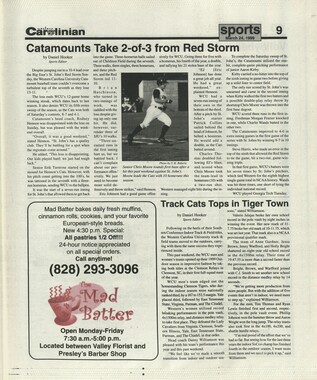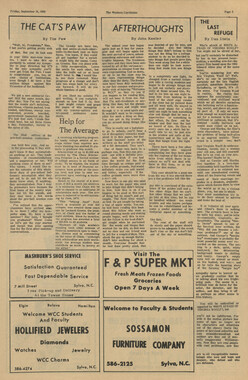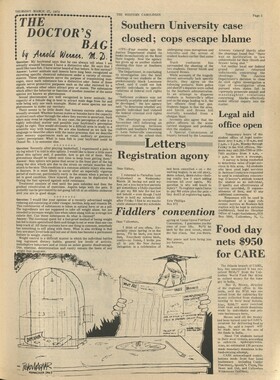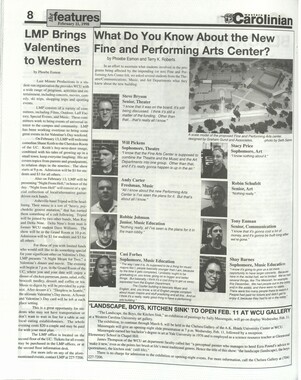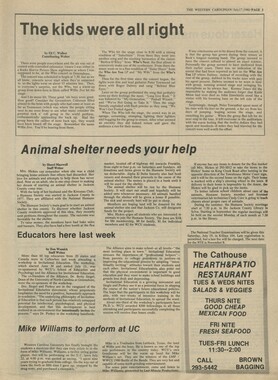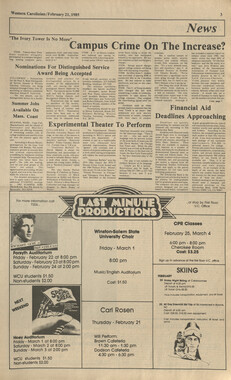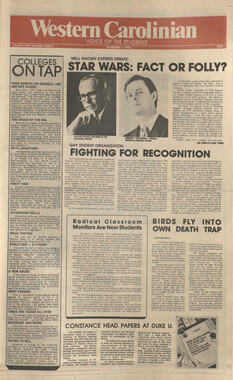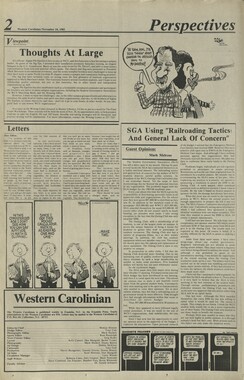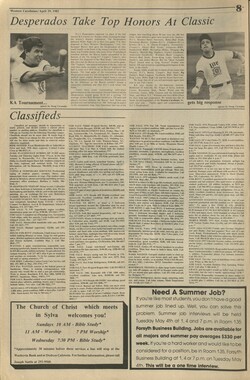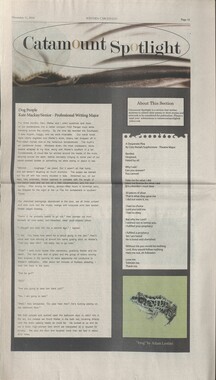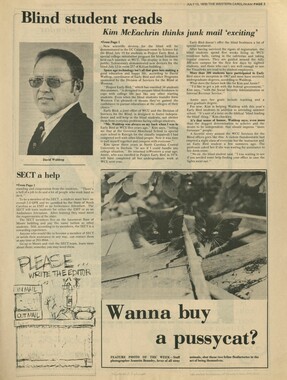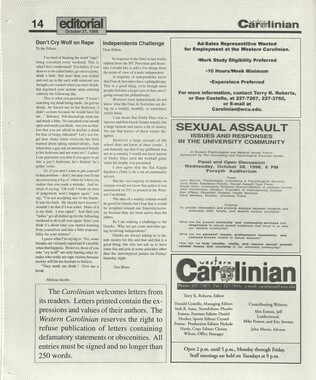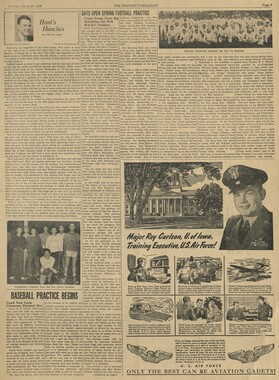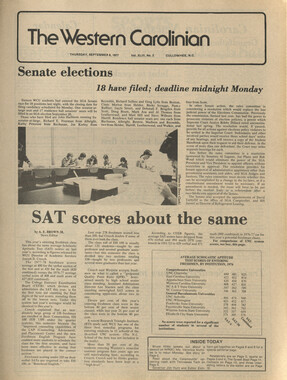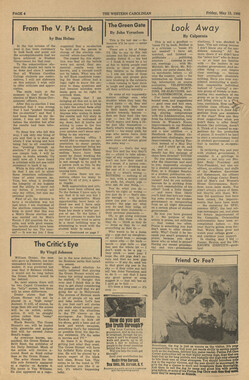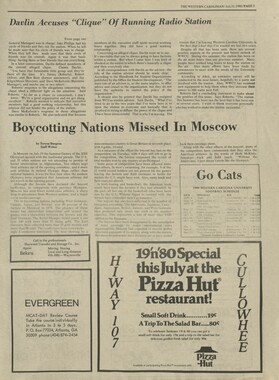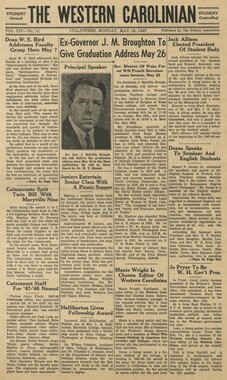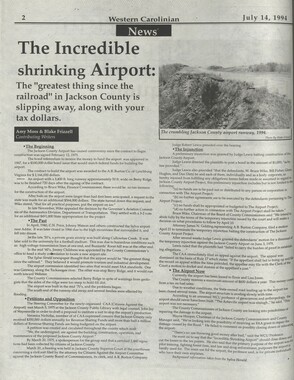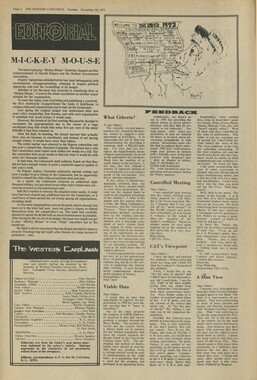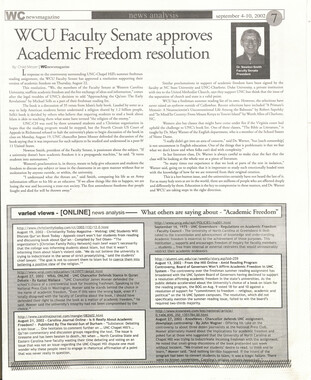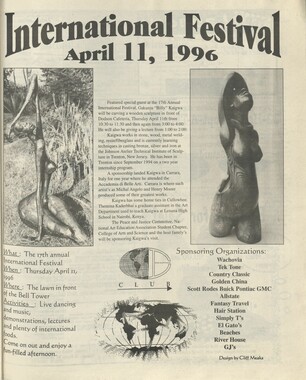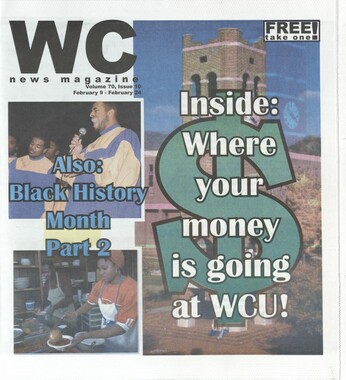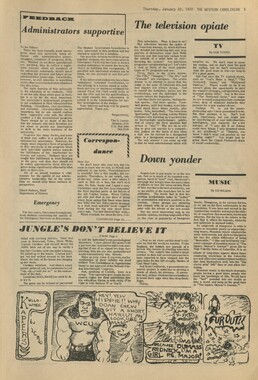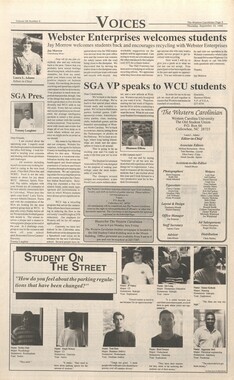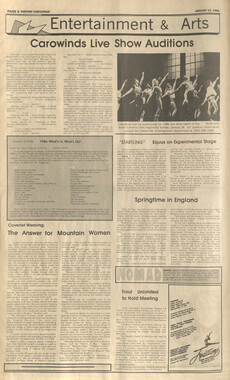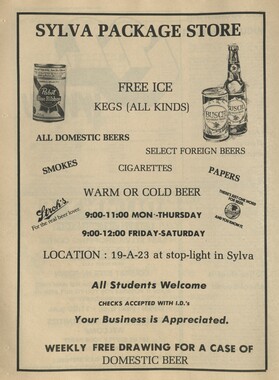Western Carolina University (21)
View all
- Canton Champion Fibre Company (2308)
- Cherokee Traditions (291)
- Civil War in Southern Appalachia (165)
- Craft Revival (1942)
- George Masa Collection (137)
- Great Smoky Mountains - A Park for America (3080)
- Highlights from Western Carolina University (422)
- Horace Kephart (973)
- Journeys Through Jackson (159)
- LGBTQIA+ Archive of Jackson County (89)
- Oral Histories of Western North Carolina (318)
- Picturing Appalachia (6617)
- Stories of Mountain Folk (413)
- Travel Western North Carolina (153)
- Western Carolina University Fine Art Museum Vitreograph Collection (129)
- Western Carolina University Herbarium (92)
- Western Carolina University: Making Memories (738)
- Western Carolina University Publications (2491)
- Western Carolina University Restricted Electronic Theses and Dissertations (146)
- Western North Carolina Regional Maps (71)
- World War II in Southern Appalachia (131)
University of North Carolina Asheville (6)
View all
- Allanstand Cottage Industries (62)
- Appalachian National Park Association (53)
- Bennett, Kelly, 1890-1974 (1463)
- Berry, Walter (76)
- Brasstown Carvers (40)
- Carver, George Washington, 1864?-1943 (26)
- Cathey, Joseph, 1803-1874 (1)
- Champion Fibre Company (233)
- Champion Paper and Fibre Company (297)
- Cherokee Indian Fair Association (16)
- Cherokee Language Program (22)
- Crowe, Amanda (40)
- Edmonston, Thomas Benton, 1842-1907 (7)
- Ensley, A. L. (Abraham Lincoln), 1865-1948 (275)
- Fromer, Irving Rhodes, 1913-1994 (70)
- George Butz (BFS 1907) (46)
- Goodrich, Frances Louisa (120)
- Grant, George Alexander, 1891-1964 (96)
- Heard, Marian Gladys (60)
- Kephart, Calvin, 1883-1969 (15)
- Kephart, Horace, 1862-1931 (313)
- Kephart, Laura, 1862-1954 (67)
- Laney, Gideon Thomas, 1889-1976 (439)
- Masa, George, 1881-1933 (61)
- McElhinney, William Julian, 1896-1953 (44)
- Niggli, Josephina, 1910-1983 (10)
- North Carolina Park Commission (105)
- Osborne, Kezia Stradley (9)
- Owens, Samuel Robert, 1918-1995 (11)
- Penland Weavers and Potters (36)
- Roberts, Vivienne (15)
- Roth, Albert, 1890-1974 (142)
- Schenck, Carl Alwin, 1868-1955 (1)
- Sherrill's Photography Studio (2565)
- Southern Highland Handicraft Guild (127)
- Southern Highlanders, Inc. (71)
- Stalcup, Jesse Bryson (46)
- Stearns, I. K. (213)
- Thompson, James Edward, 1880-1976 (226)
- United States. Indian Arts and Crafts Board (130)
- USFS (683)
- Vance, Zebulon Baird, 1830-1894 (1)
- Weaver, Zebulon, 1872-1948 (58)
- Western Carolina College (230)
- Western Carolina Teachers College (282)
- Western Carolina University (2008)
- Western Carolina University. Mountain Heritage Center (18)
- Whitman, Walt, 1819-1892 (10)
- Wilburn, Hiram Coleman, 1880-1967 (73)
- Williams, Isadora (3)
- Cain, Doreyl Ammons (0)
- Crittenden, Lorraine (0)
- Rhodes, Judy (0)
- Smith, Edward Clark (0)
- Appalachian Region, Southern (3032)
- Asheville (N.C.) (1945)
- Avery County (N.C.) (26)
- Blount County (Tenn.) (195)
- Buncombe County (N.C.) (1680)
- Cherokee County (N.C.) (283)
- Clay County (N.C.) (556)
- Graham County (N.C.) (238)
- Great Smoky Mountains National Park (N.C. and Tenn.) (525)
- Haywood County (N.C.) (3573)
- Henderson County (N.C.) (70)
- Jackson County (N.C.) (4925)
- Knox County (Tenn.) (35)
- Knoxville (Tenn.) (13)
- Lake Santeetlah (N.C.) (10)
- Macon County (N.C.) (421)
- Madison County (N.C.) (216)
- McDowell County (N.C.) (39)
- Mitchell County (N.C.) (135)
- Polk County (N.C.) (35)
- Qualla Boundary (982)
- Rutherford County (N.C.) (78)
- Swain County (N.C.) (2185)
- Transylvania County (N.C.) (270)
- Watauga County (N.C.) (12)
- Waynesville (N.C.) (86)
- Yancey County (N.C.) (72)
- Aerial Photographs (3)
- Aerial Views (60)
- Albums (books) (4)
- Articles (1)
- Artifacts (object Genre) (228)
- Bibliographies (1)
- Biography (general Genre) (2)
- Cards (information Artifacts) (38)
- Clippings (information Artifacts) (192)
- Copybooks (instructional Materials) (3)
- Crafts (art Genres) (622)
- Depictions (visual Works) (21)
- Design Drawings (1)
- Digital Moving Image Formats (2)
- Drawings (visual Works) (185)
- Envelopes (101)
- Exhibitions (events) (1)
- Facsimiles (reproductions) (1)
- Fiction (general Genre) (4)
- Financial Records (12)
- Fliers (printed Matter) (67)
- Glass Plate Negatives (381)
- Guidebooks (2)
- Internegatives (10)
- Interviews (823)
- Land Surveys (102)
- Letters (correspondence) (1045)
- Manuscripts (documents) (618)
- Maps (documents) (177)
- Memorandums (25)
- Minutes (administrative Records) (59)
- Negatives (photographs) (6090)
- Newsletters (1290)
- Newspapers (2)
- Notebooks (8)
- Occupation Currency (1)
- Paintings (visual Works) (1)
- Pen And Ink Drawings (1)
- Periodicals (194)
- Personal Narratives (10)
- Photographs (12977)
- Plans (maps) (1)
- Poetry (6)
- Portraits (4568)
- Postcards (329)
- Programs (documents) (181)
- Publications (documents) (2444)
- Questionnaires (65)
- Relief Prints (26)
- Sayings (literary Genre) (1)
- Scrapbooks (282)
- Sheet Music (2)
- Slides (photographs) (402)
- Songs (musical Compositions) (2)
- Sound Recordings (802)
- Specimens (92)
- Speeches (documents) (18)
- Tintypes (photographs) (8)
- Transcripts (329)
- Text Messages (0)
- A.L. Ensley Collection (275)
- Appalachian Industrial School Records (7)
- Appalachian National Park Association Records (336)
- Axley-Meroney Collection (2)
- Bayard Wootten Photograph Collection (20)
- Bethel Rural Community Organization Collection (7)
- Blumer Collection (5)
- C.W. Slagle Collection (20)
- Canton Area Historical Museum (2110)
- Carlos C. Campbell Collection (462)
- Cataloochee History Project (64)
- Cherokee Studies Collection (4)
- Daisy Dame Photograph Album (5)
- Daniel Boone VI Collection (1)
- Doris Ulmann Photograph Collection (112)
- Elizabeth H. Lasley Collection (1)
- Elizabeth Woolworth Szold Fleharty Collection (4)
- Frank Fry Collection (95)
- George Masa Collection (173)
- Gideon Laney Collection (452)
- Hazel Scarborough Collection (2)
- Hiram C. Wilburn Papers (28)
- Historic Photographs Collection (236)
- Horace Kephart Collection (861)
- Humbard Collection (33)
- Hunter and Weaver Families Collection (1)
- I. D. Blumenthal Collection (4)
- Isadora Williams Collection (4)
- Jesse Bryson Stalcup Collection (47)
- Jim Thompson Collection (224)
- John B. Battle Collection (7)
- John C. Campbell Folk School Records (80)
- John Parris Collection (6)
- Judaculla Rock project (2)
- Kelly Bennett Collection (1482)
- Love Family Papers (11)
- Major Wiley Parris Civil War Letters (3)
- Map Collection (12)
- McFee-Misemer Civil War Letters (34)
- Mountain Heritage Center Collection (4)
- Norburn - Robertson - Thomson Families Collection (44)
- Pauline Hood Collection (7)
- Pre-Guild Collection (2)
- Qualla Arts and Crafts Mutual Collection (12)
- R.A. Romanes Collection (681)
- Rosser H. Taylor Collection (1)
- Samuel Robert Owens Collection (94)
- Sara Madison Collection (144)
- Sherrill Studio Photo Collection (2558)
- Smoky Mountains Hiking Club Collection (616)
- Stories of Mountain Folk - Radio Programs (374)
- The Reporter, Western Carolina University (510)
- Venoy and Elizabeth Reed Collection (16)
- WCU Gender and Sexuality Oral History Project (36)
- WCU Mountain Heritage Center Oral Histories (25)
- WCU Oral History Collection - Mountain People, Mountain Lives (71)
- WCU Students Newspapers Collection (1923)
- Western North Carolina Tomorrow Black Oral History Project (69)
- William Williams Stringfield Collection (2)
- Zebulon Weaver Collection (109)
- African Americans (390)
- Appalachian Trail (35)
- Artisans (521)
- Cherokee art (84)
- Cherokee artists -- North Carolina (10)
- Cherokee language (21)
- Cherokee pottery (101)
- Cherokee women (208)
- Church buildings (190)
- Civilian Conservation Corps (U.S.) (111)
- College student newspapers and periodicals (2012)
- Dams (108)
- Dance (1023)
- Education (222)
- Floods (63)
- Folk music (1015)
- Forced removal, 1813-1903 (2)
- Forest conservation (220)
- Forests and forestry (1198)
- Gender nonconformity (4)
- Great Smoky Mountains National Park (N.C. and Tenn.) (181)
- Hunting (47)
- Landscape photography (25)
- Logging (122)
- Maps (83)
- Mines and mineral resources (9)
- North Carolina -- Maps (18)
- Paper industry (38)
- Postcards (255)
- Pottery (135)
- Railroad trains (72)
- Rural electrification -- North Carolina, Western (3)
- School integration -- Southern States (2)
- Segregation -- North Carolina, Western (5)
- Slavery (5)
- Sports (452)
- Storytelling (243)
- Waterfalls -- Great Smoky Mountains (N.C. and Tenn.) (66)
- Weaving -- Appalachian Region, Southern (280)
- Wood-carving -- Appalachian Region, Southern (328)
- World War, 1939-1945 (173)
Western Carolinian Volume 67 Number 15
Item
Item’s are ‘child’ level descriptions to ‘parent’ objects, (e.g. one page of a whole book).
-
-
newsmagazine student livin Jill Sobule in UC I Illusions I November 19 | 9 P. M. -LMP PRESENTS: Jill Sobule Appearing at Illusions November 19 The post-punk pop princess Jill Sobule will be coming to Cullowhee on Nov. 19. You might know her from the video for her song eel Kissed a Girl, " which made her and Fabio MTV staples during the summer of 1995, or the song "Supermodel," which was featured in the Amy Heckerling flick "Clueless. " She has more songs, and she really wants to perform them for you. "l Kissed a Girl," a satirical piece about the media's fascination with "lesbian chic," was the beginning of Sobule's commercial career. However, she had been around for years before it hit the airwaves. The singer/songwriter was born in Denver, Colorado in 1961. Sobule fiddled around with music until she spent her junior year of college abroad in Spain and decided to try music as a career. She released her debut album, "Things Here Are Different, " on MCA Records but was dropped like a hot rock when units did not move off of store shelves. Disheartened and destitute, Sobule moved to Los Angeles and took a job as an assistant to a wedding photographer. Then mysterious serendipity took over when her lawyer played her demo for an executive at Atlantic Records, and they decided to offer her a contract. She recorded a self-titled album containing "l Kissed a Girl" and "Supermodel," and it was a modest success. The LP "Happy Town" followed in 1997 and became an immediate critical darling. Seeing that critical acclaim is record store poison, it is no surprise that Atlantic jettisoned Sobule when the album did not sell like the one before it. She took time off after that, played in Lloyd Cole's backing band the Negatives, and found a new label. Beyond Records released "Pink Pearl" in 2000 and the best-of collection, "l Never Learned to swim: Jill Sobule 1990- 2000." If you like your music catchy and clever, come see the show on Nov. 19 in Illusions on the top floor of the AK Hinds University Center. The show starts at 9 P. M. Tickets are $2 for WCU students w/lD and $4 for all others. For more info call the UC at 227-7206. THE BOTTOM LINE By.' Lée SchWarz' I WCnewsmagazine Credit Protection: What a Crock! You do not need credit protection or account guard or any other cheesy offer from your credit card company. Every credit card I have is trying to push an offer like this onto me. They keep calling me trying to get me to agree. I always say "no," and I'll tell y'all why. They ask, "Don't you want to insure your credit cards in light of the increase in identity theft and credit fraud in general?" They also ask, "Aren't you afraid of someone stealing your credit cards?" Well, I'd be lying if I told you that I wasn't afraid. However, I used logic, in place of fear, to make the decision about credit protection. It is logical to say reno, " because I know that they are charging me more money to prevent fraud than what the fraud would cost me. Federal law states the no one shall be held liable for more than $50 in the event of credit card fraud. With that in mind, who needs credit protection? I don't and neither do you. These companies try to take advantage of your fear and ignorance of the law. Don't let them. Monitor your accounts and call the credit card company immediately if there is a charge on your card that you did not make. No matter what they say, be adamant about getting the charge removed. Don't let them put you on hold and give you the run-around. You should never ever have to pay more than $50 on a fraudulent purchase. In reality, if you complain enough to a lot of people over the phone, you probably won't have to pay anything. Just be calm, adamant, keep your language clean and don't yell. If you make complete sense, and are civil, you will get your way nine times out of 10. Quit your Money talks The Schwarz Factor bypassing the credit protection charges;yoücan save $10/month on averagel*Å months 0=S120 ayeäf.i$ 20±4+480. But"? say that one day you are hit witha $50 fee on fraudulent We'll take yourS480 and subtract $50 and invest the $430. Take tha€• $430 from the credit card man and invest it form yeais @ 20% and you'll have $16,485.34. Don't pay for something you really don't need. november 13-19, 200 LMT) PRESENTS: 'Following Lives ' of Young People Left :GOut in the Cold' ' Last Minute Productions will present "Out in the Cold," a powerful consciousness-raising documentary about homeless gay, lesbian, bisexual and transgendered young people on Monday, November 18 at 8 P. M. in the UC Grandroom. This film is FREE. The first film project funded by the Matthew Shepard Foundation, the 51- minute film will be followed by a discussion with filmmaker Eric Criswell. The statistics: An estimated 1.3 million American young people are homeless, dying at a rate of 13 per day. It is further estimated that about 500,000 of these homeless are homosexual, bisexual, or transgendered. Experts assert that within 48 hours of leaving home, 42% of these kids, straight or gay, turn to prostitution to survive. In a straightforward, talkingheads format, Criswell introduces about a dozen young people who either have been thrown out or driven out of their homes when they came out to their families, and they all have horror stories. Much of the documentary was shot in Indianapolis, which means that "Out in the Cold" plumbs the depths of homophobia in America's heartland — and unsurprisingly finds it virtually bottomless. According to the documentary, all the parents who cast out their children, who had already endured harassment at school, did so out of a conservative religious conviction so strong it outweighed any consideration as to how their offspring were going to survive. Rhea Murray, who is from Seymour, IN, an inviting-looking rural community right out of a Norman Rockwell painting, says that such parents probably have always regarded their children as property rather than individuals. She should know. She struggled to accept that her own son, Bruce, is gay. In accepting him, she has paid the price. Being ostracized by her church and neighbors, she has also become the only person many youngsters in her area can turn to for help and guidance. Another rural Indiana youth describes how lucky he was that his grandmother took him in after his father cast him out, after telling him he hoped he would die of AIDS. His grandmother stood by him when her minister told her not to shelter her own grandson. In Indianapolis, a man who came of age homeless, who now helps homeless youth, spells out just how dangerous it is to live in the street, especially at night and in freezing winter temperatures. As a mother whose son was murdered, Judy Shepard says she cannot understand how a parent could not love his or her child and cast him or her out on the basis of sexual orientation. If you need anymore information concerning the program please call 227- 7479.
Object
Object’s are ‘parent’ level descriptions to ‘children’ items, (e.g. a book with pages).
-
The Western Carolinian is Western Carolina University's student-run newspaper. The paper was published as the Cullowhee Yodel from 1924 to 1931 before changing its name to The Western Carolinian in 1933.
-
